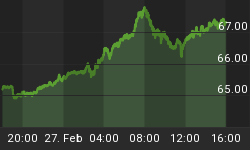Pitifully Late Recognition of the Obvious
It's been pretty clear that the global economy has been slowing for some time, but recognition of that fact has been pitifully slow.
In January, the Fed still believed it would get in four rate hikes this year. The IMF also held to its overoptimistic global growth estimates.
Amusingly, the Fed still believes recent weakness is "transitory", but the always late to the party IMF changed its tune today in the wake of miserable trade data from China.
Also today, the Organization for Economic Co-operation and Development (OECD) joined the IMF today with a warning about global growth.
The OECD specifically warned that leading indicators for the United Kingdom, the United States, Canada, Japan and Germany suggest easing of growth.
Signs of Easing Growth in the OECD Area
Please consider the OECD report Signs of Easing Growth in the OECD Area.
The outlook points to easing growth in the United Kingdom, the United States, Canada and Japan. Similar signs are also emerging in Germany.
Stable growth momentum is anticipated in Italy and in the Euro area as a whole. In France, and India, CLIs point to stabilizing growth momentum.
The outlook for China remains unchanged from last month's assessment, pointing to tentative signs of stabilization, while in Russia and Brazil the CLIs point to a loss in growth momentum.
Let's take a look at various OECD charts, anecdotes in red by me.
OECD comment: "The following graphs show country specific composite leading indicators (CLIs). Turning points of CLIs tend to precede turning points in economic activity relative to trend by approximately six months. The horizontal line at 100 represents the trend of economic activity. Shaded triangles mark confirmed turning-points of the CLI. Blank triangles mark provisional turning-points that may be reversed."
OECD Area

There are 20 OECD countries. Here is the OECD Member List.
OECD China

Given the collapse in Chinese exports and imports, reports of stabilization in China are ridiculous.
OECD Eurozone

OECD Germany

OECD France

OECD Japan

OECD UK

OECD Canada

Notes: There are 20 OECD countries. Only France, Italy, and India are above the 100 mark. I saved the best chart for last.
OECD United States

Anyone spot a little wishful thinking if not outright OECD bias in announcing peaks?
Economic Derailment
Collectively, these charts do not point to a slowing in growth, they point to a confirmed global recession. The only reason a global recession hasn't been announced is growth lies from China.
For a related story, please see "IMF Warns About Risk of Economic Derailment" as Chinese exports plunge most since 2009.















